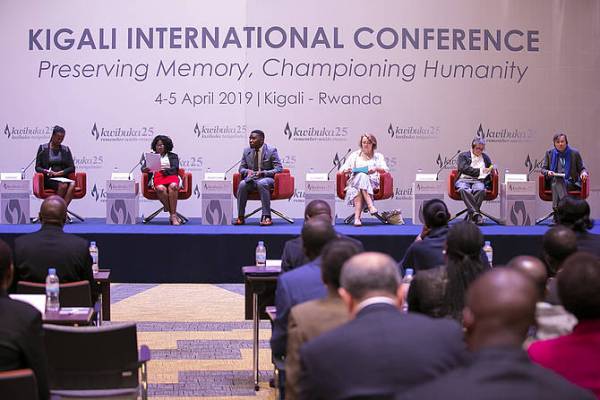
Kigali: From Thursday 4th to Friday 5th April, 2019, Over 500 participants, including scholars and policymakers from all over the world gathered at Intare Conference Arena in Kigali, for the International Conference on the 25th Commemoration of the Genocide against the Tutsi in 1994.
The International Conference was organized under the theme “Preserving Memory, Championing Humanity”.
The two-day conference attracts scholars & policymakers from all over the world to discuss theory and practice in the areas of reconstruction, resilience, dealing with trauma as well as identity politics.
It was also graced by Jeannette Kagame, the First Lady of Rwanda and Edouard Ngirente, Rwanda’s Prime Minister.
While welcoming the participants, Jean-Damascene Bizimana, Executive Secretary of the National Commission for the Fight against Genocide (CNLG) said that the conference was meant to be time to have a reflection session on the Genocide against the Tutsi, Rwanda’s reconstruction, as well as perspectives and challenges of a post-genocide society.
He said that in 1994, despite the international community’s pledge that the Genocide would never happen again, and with all the legal tools in place, the extremist regime was able to conduct the Genocide against the Tutsi.
Olusegun Obasanjo, former president of Nigeria who gave his opening remarks hailed the strides made by Rwanda in the last 25 years in post-genocide recovery, restoration of unity among Rwandans as well as fast and inclusive economic growth.
“Rwandans have achieved a lot including Imihigo, Gacaca, but most importantly living together, 25 years after the Genocide. In Rwanda today, there are no Hutu or Tutsi anymore. You are all Rwandans. We all appreciate Rwanda’s progress”, he stated.
The first panel that featured Stéphane Audoin-Rouzeau, directeur d’études à l’École des hautes études en sciences sociales (EHESS) et président du Centre international de recherche de l’Historial de la Grande Guerre de Péronne, dans la Somme, Edouard bamporiki, Chairman of National itorero Commission, Catherine Coquio de Université Denis-Diderot, Aleksander Edelman, a film maker and Boatamo Mosupyoe from the California State University, Sacramento focused on on the Perspectives of a Post-Genocide Generation.
The panel addressed the different questions pertaining to What are the lessons, challenges and threats should future generations take note of from the last 25years of restoring humanity within Rwandan society and the international community, and what we can learn from comparative analysis among others.
Edouard Bamporiki said that the current generation has grown in a system where people are treated equally, and has got the right education, recalling that it is true that people still have wounds and trauma even though there is promising future. He reminded that there is a need to heal each other.
Boatamo Mosupyoe argued that Justice is key in the reconciliation process. She emphasized that Rwanda’s approach of using Gacaca courts as a home-grown solution has been helpful and that there are a lot of lessons to learn from such an approach.
“There has to be continued education from generations to generations – teaching them accountability and responsibility – to ensure that the genocide never happens again”, she explained.
The panel that featured Frank Chalk, from Concordia University, David Gakunzi, a Rwandan journalist based in Europe, Victoria Fontan from the American University of Afghnistan, Bishop John Rucyahana, president of National Unity and Reconciliation Commission (NURC) and author Andrew Wallis, focused on Genocide and Collapse of Society.
This panel focuses on the role of the state, church, and media in the propagation of genocide ideology and the disintegration of the social fabric of Rwanda and how it led to the Genocide perpetrated against the Tutsi in 1994.
The day one of the International Conference concluded with the Café Littéraire that featured three authors namely Virginie Brinker (France) Kously Lamko (Chad) and Jean-Marie Vianney Rurangwa (Rwanda). It was held under the theme preserving the memory of the 1994 Genocide against the Tutsi. It was also graced by HE Jeannette Kagame, the First Lady of Rwanda. (End)
